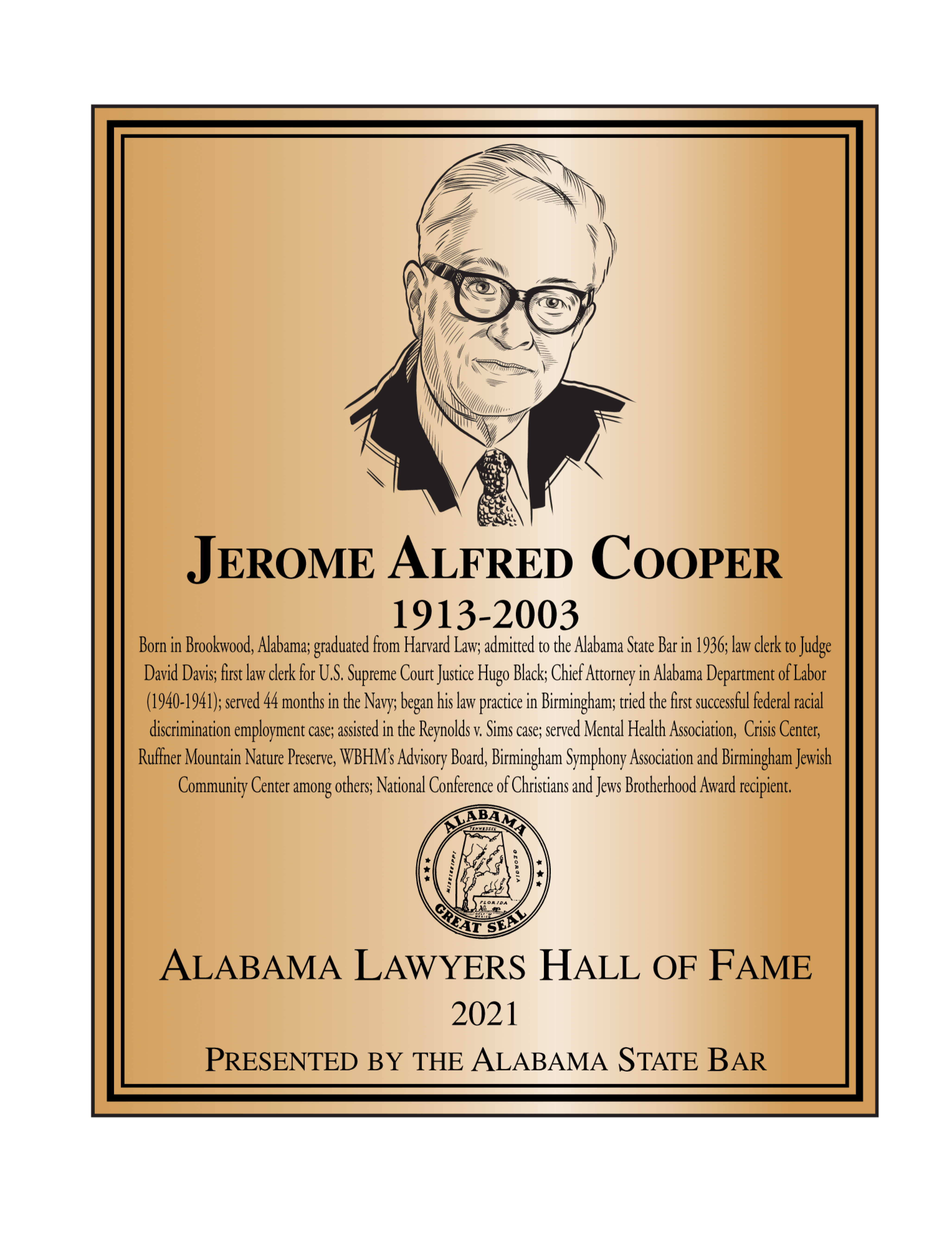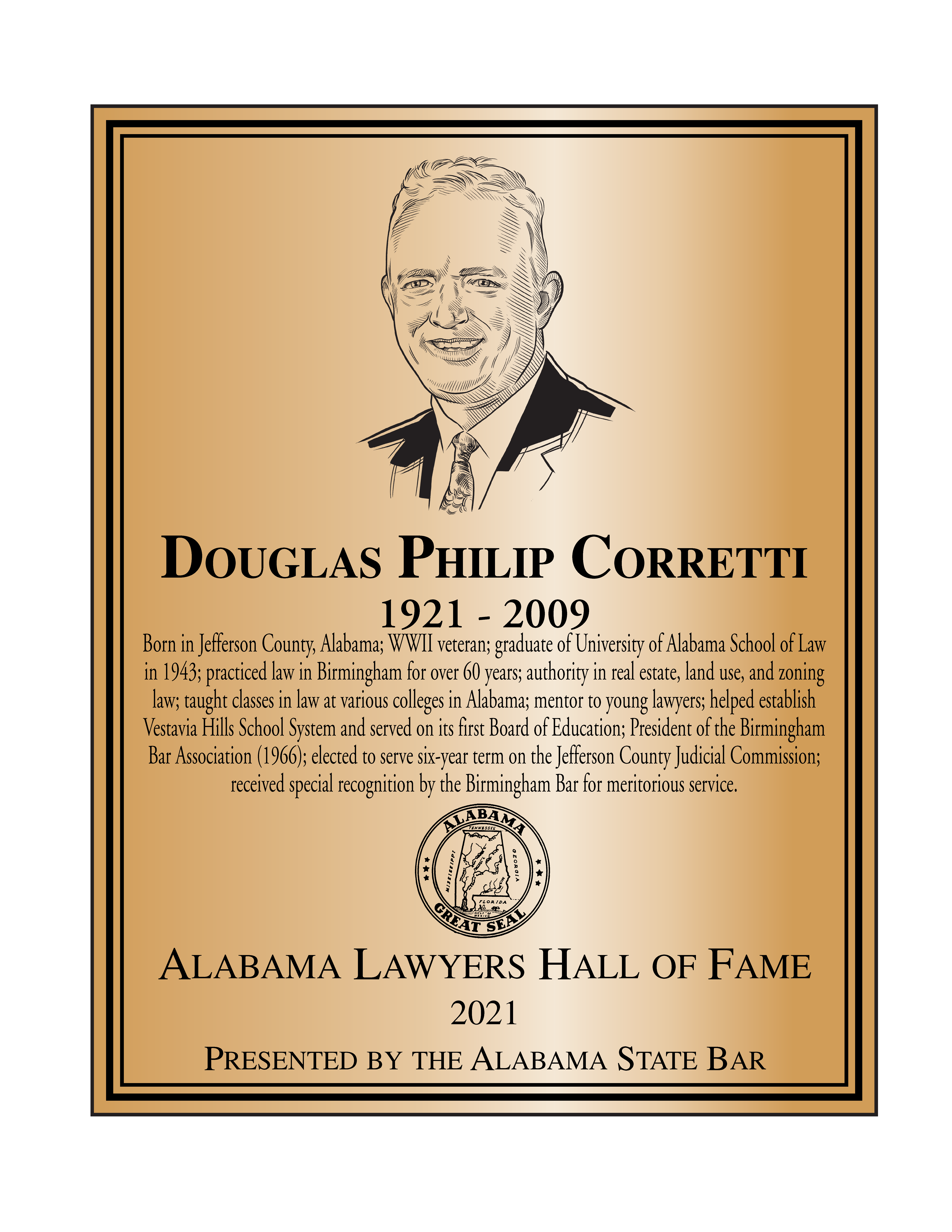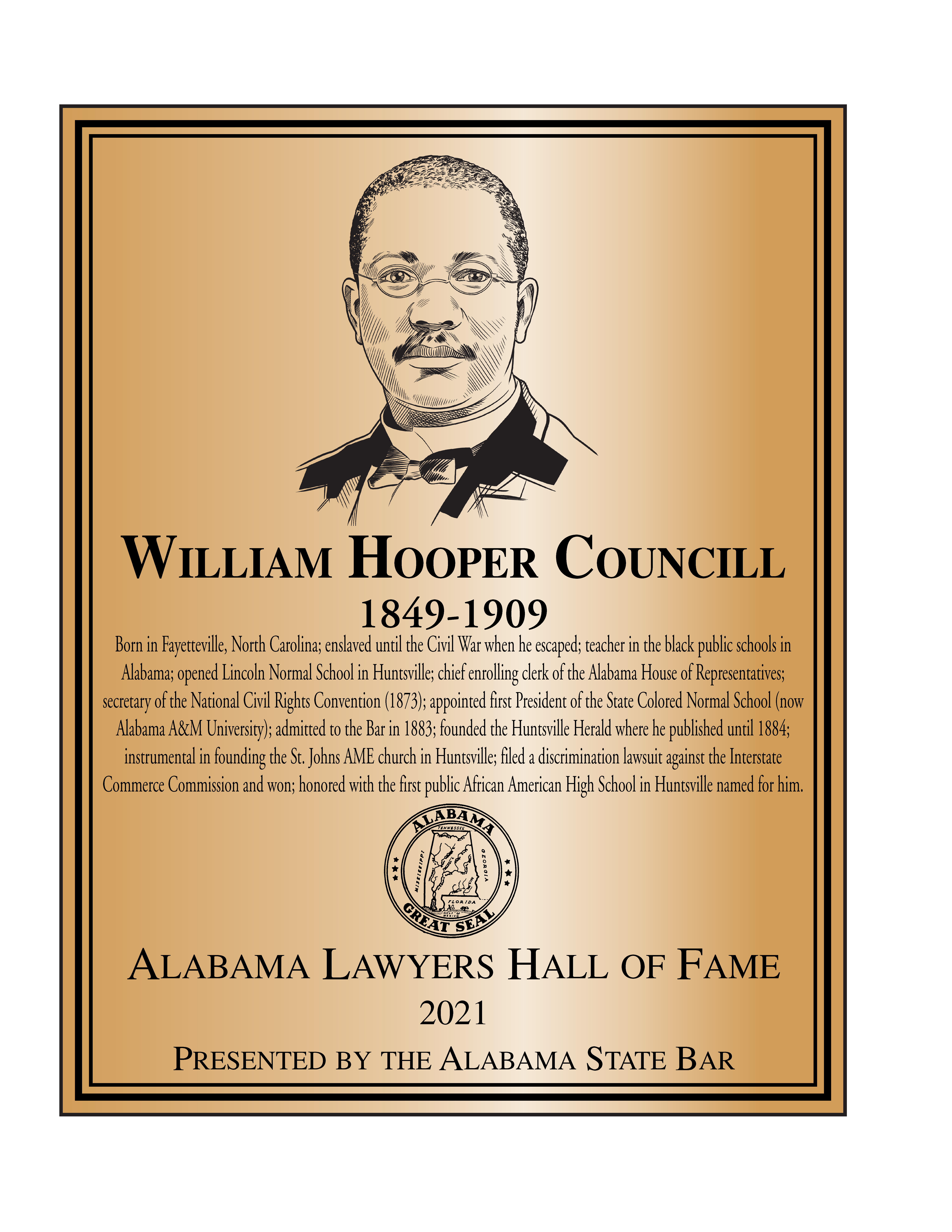Hall of Fame Class – 2021
- Charles Baker Arendall, Jr. (1915-1993)
-
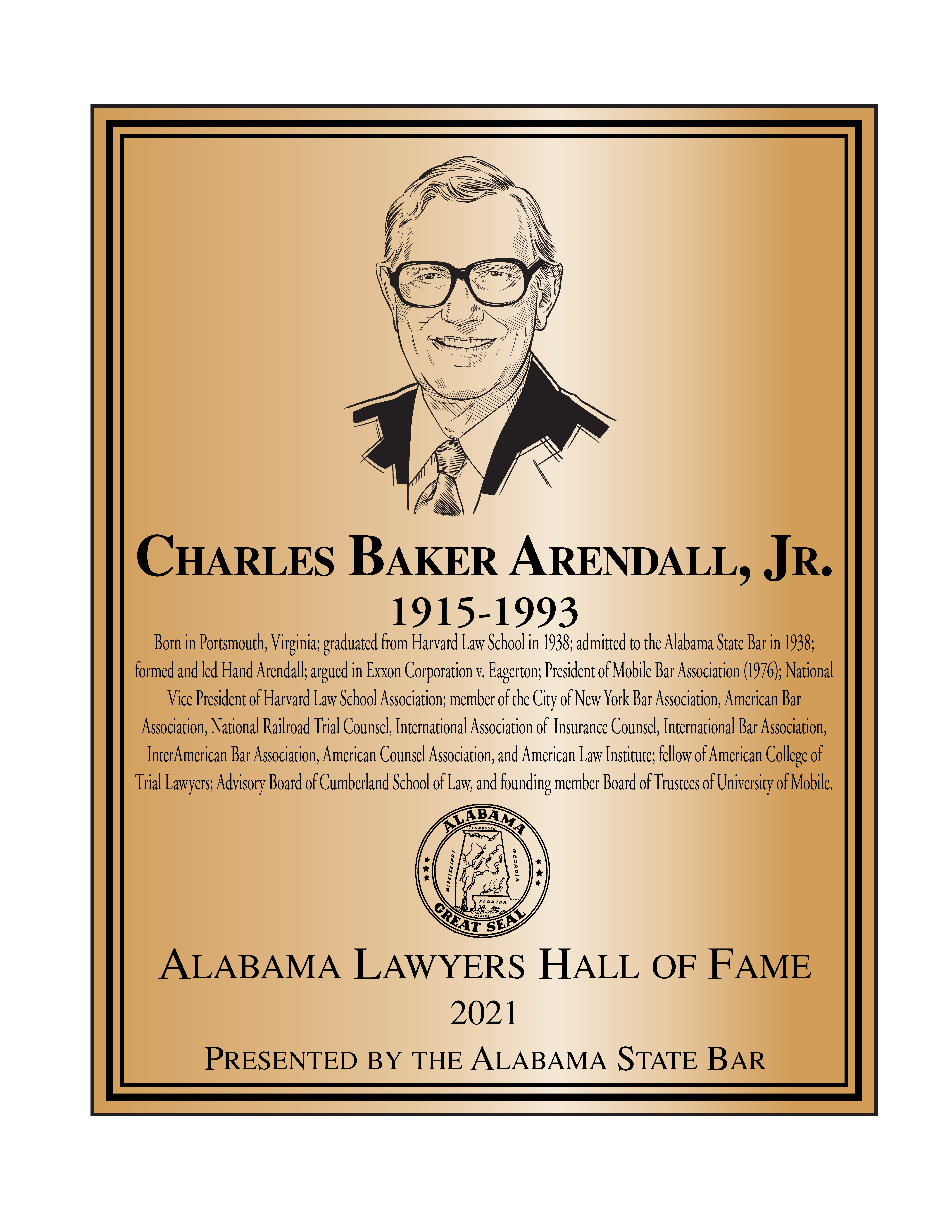 Charles Baker Arendall, Jr. (“Charlie”) was born in 1915 in Portsmouth, Virginia, to C.B. Arendall and Kate F. (Peacock) Arendall. The family moved to Mobile, Alabama in 1924, where Arendall’s father served as Pastor of Dauphin Way Baptist Church for many years and as a leader in the Southern Baptist Convention. Arendall was the oldest of four brothers. He married Nan Eager (Boone) Arendall, whose father was also a Baptist Pastor, in Louisville, Kentucky in 1944, and they had four daughters.
Charles Baker Arendall, Jr. (“Charlie”) was born in 1915 in Portsmouth, Virginia, to C.B. Arendall and Kate F. (Peacock) Arendall. The family moved to Mobile, Alabama in 1924, where Arendall’s father served as Pastor of Dauphin Way Baptist Church for many years and as a leader in the Southern Baptist Convention. Arendall was the oldest of four brothers. He married Nan Eager (Boone) Arendall, whose father was also a Baptist Pastor, in Louisville, Kentucky in 1944, and they had four daughters.After attending Murphy High School in Mobile, Arendall received his Bachelor of Arts degree from the University of Richmond in 1935. At the University of Richmond, Arendall was Editor-in-Chief of the student newspaper The Collegian, a member of Omicron Delta Kappa honor society, and participated in campus plays and student government, among many other student activities. Arendall received his law degree from Harvard Law School in 1938, graduating cum laude. At Harvard, Arendall was selected to serve as a Student Advisor.
Arendall was admitted to the Alabama State Bar and joined the Mobile Bar Association in 1938. He began his legal career as an associate with the law firm of Smith & Johnston from 1938 to 1941. He went on to form Hand Arendall in Mobile, which is now Hand Arendall Harrison Sale LLC. Arendall led Hand Arendall for several decades.
Arendall was an accomplished trial lawyer and has also been described as an able office and transactional lawyer. In 1983, he argued on behalf of the appellants to the United States Supreme Court in Exxon Corporation v. Eagerton. He also appeared regularly before the Alabama Supreme Court and litigated numerous cases in state and federal courts.
Arendall served as President of the Mobile Bar Association in 1976, and as National Vice-President of the Harvard Law School Association and President of the Alabama Unit. He was a member of the Association of the Bar of the City of New York and the American Bar Association. Arendall was also a Fellow of the American College of Trial Lawyers, and a member of the National Association of Railroad Trial Counsel, the International Association of Insurance Counsel, the International Bar Association, the InterAmerican Bar Association, the American Counsel Association, and the American Law Institute.
Arendall was a founding member of the Board of Trustees of the University of Mobile, and in 1991 a residential hall at the school was named in his honor. He served on the Advisory Board of the Cumberland School of Law. He was also extremely active in church and civic affairs, serving as a Sunday school teacher and deacon.
One of Arendall’s partners, Massey Bedsole, remarked, “he was a wise and compassionate counselor and was a giant in his profession. He enjoyed life to the fullest. Whatever he did, whether it was fun or profession, he did 100 percent.” Arendall died on June 24, 1993 in Mobile. The Alabama State Bar is proud to recognize him as a member of the Alabama Lawyers’ Hall of Fame.
- Jerome Alfred (Buddy) Cooper (1913-2003)
-
Jerome Alfred (Buddy) Cooper was born in Brookwood, Alabama on January 15, 1913, the son of immigrants, a Polish mother who came to the United States before she was a year old, and a Lithuanian father, who came here as a teenager. And though he moved from Brookwood to Birmingham at 7 years old, he never forgot the screams and cries of women and children running to the mines when the bells signaled a collapse or fire.
In Buddy’s formative years, his family was prosperous, and Buddy was offered a merit scholarship to Harvard when he was sixteen. At his father’s urging, Buddy turned down the scholarship so it could go to someone who needed the money. When the stock market crashed, so did his family’s fortune, but Harvard again offered him a scholarship, with Buddy now being the one in need. After graduating Cum Laude, Buddy went on to graduate from Harvard Law, again through scholarships. He was admitted to the Alabama Bar at the age of 23. The Dean of Harvard Law suggested to U.S. District Judge David J. Davis, that he hire Buddy as his law clerk or “secretary” as they were called at that time. Judge Davis took the advice and hired Buddy. After he held that position for approximately a year, Senator Hugo Black was appointed as a Justice to the U.S. Supreme Court. Buddy was in Judge Davis’ office when Black called, wanting Buddy to clerk for him. When asked by Judge Davis if he wanted the position, Buddy said he would have to ask his father. He returned with the news that he would take the offer, but only if Judge Davis would not be inconvenienced by his leaving.
Buddy became Justice Black’s first law clerk. He returned to Birmingham as the Chief Attorney in the Alabama Department of Labor from 1940 to 1941. Two days after Pearl Harbor, he left that position and family to join the Navy. He had to finesse his way in because he could not pass the vision test. He was a pacifist but said he couldn’t live in a would run by Hitler. He served 44 months, leaving as a Lt. Commander, and returned to Birmingham where he began his labor law practice.
Representing unions and organizers in the forties and fifties, he tried the first successful federal racial discrimination employment case in 1950. He worked tirelessly in a legally segregated society bringing white and black community organizers together in the same union halls, restaurant basements and churches. He held to his ideals of justice and equality, and did so at great cost. He was ostracized by many in Birmingham and his family endured bomb threats.
At the epicenter of the civil rights movement in 1963 was the children’s crusade in Birmingham. Bull Connor, in reaction to the juvenile marches organized by Dr. King, had the children arrested and detained in animal corrals at the State Fairgrounds since the jails were filled with adult marchers. The children’s bail was collectively more than $240,000. President Kennedy, concerned with the on-going Birmingham demonstrations, sent a representative to broker a deal concerning the children. The UAW, AFL-CIO, USW and TWU all sent money. Buddy received the money and helped arrange to use it to bail out the children and avert further violent demonstrations. That agreement helped pave the way for passage of the 1964 Civil Rights Act.
Buddy assisted in the Reynolds v. Sims case, the 1964 Supreme Court decision which changed America with its “one man, one vote” principle. He carried his passion and courageous ideals into the community, receiving the National Conference of Christians and Jews Brotherhood Award and by serving the Mental Health Association, the Crisis Center, Ruffner Mountain Nature Preserve, WBHM’s Advisory Board, the Birmingham Symphony Association and the Birmingham Jewish Community Center among many other organizations.
Buddy continued his practice until retirement at age 90 in 2003. He died two months later. Adopting the ancient principles of the Torah to the modern world, he held tenaciously to his ideals of truth and law, of justice and equality, finding a way to make the world better for all.
- Douglas Phillip Corretti (1921-2009)
-
Douglas Phillip Corretti was born in Jefferson County, Alabama on September 18, 1921 to John B. and Lucy Roberts Corretti. His father had emigrated to America as a young boy from Aurono, Italy, an Alpine area near Switzerland, in the early 1900’s, and lived most of his life in Fairfield, Alabama. The elder Corretti worked 40 years at United States Steel in Fairfield but he also found success as a builder and owner of apartment properties and a developer of other real estate. His sons Billy and Johnny worked with him as construction contractors and Douglas provided legal services. This family involvement with real estate served Douglas Corretti well, giving him a practical background in real property that evolved into his area of expertise.
Douglas Corretti graduated from Fairfield High School and then received his Bachelor’s degree from the University of Alabama in 1943. In that year he entered the military and served his country until the end of World War II. He then returned to the University of Alabama, graduating from its law school in 1948, the same year he began practicing law in Birmingham, which he continued to do for more than 60 years.
During his legal career, Mr. Corretti became an authority in real estate, land use, and zoning law. He was recognized by his peers as the expert to be called upon in real estate matters. He handled many cases for clients and was a successful real estate investor himself. He enjoyed teaching law and at various times he taught Contracts and Real Estate law at the Birmingham School of Law, the University of Alabama, UAB, and Jefferson State Community College. He was particularly interested in assisting younger lawyers and he became a mentor to many of them throughout his career. As stated in his nomination for the Hall of Fame, whenever a lawyer had a case with a complicated real estate issue, Doug Corretti could always be called on or visited at his office to discuss the problem and seek a solution.
As a community servant, Mr. Corretti helped to establish the Vestavia Hills School System and he served on its first Board of Education. He served as President of the Birmingham Bar Association in 1966. In December of 1969, the high regard that the lawyers of Birmingham had for him was shown when he was elected by the Birmingham Bar Association to serve a six-year term from January 16, 1970 to January 16, 1976 on the Jefferson County Judicial Commission. This is the authority that whenever a judicial vacancy occurs in Jefferson County, takes applications, interviews, and then selects three finalists whose names are submitted to the Governor for selection to complete a judicial term of office. And in 1988, he received special recognition by the Birmingham Bar for meritorious service to the profession.
Doug Corretti was a scholar in the law who appreciated its history, but moreover he was a gentleman of the law. He cared about his clients, the courts, his fellow attorneys, and the legacy of the profession through mentorship. The Alabama State Bar is proud to recognize him as a member of the Alabama Lawyers’ Hall of Fame.
- William Hooper Councill (1849-1909)
-
William Hooper Councill was born on July 12, 1849 in Fayetteville, NC. His father, mother, and three brothers were slaves on the Councill Plantation. When Mr. Councill was five years old, his father escaped to Canada but was unable to obtain freedom for the rest of the family. Mr. Councill, his mother, and one brother were sold at the Richmond Slave Market and were later sold to a prominent resident of Huntsville, Alabama. His other two brothers were sold separately and he never saw them again. Mr. Councill worked as a cotton picker during his enslavement. When the Civil War broke out, he escaped to freedom to Chattanooga, Tennessee.
After the war ended, at the age of sixteen, Mr. Councill returned to Alabama and attended a school for freedmen that had been started by Quakers. He graduated after two years and became a teacher in the black public schools in Alabama. While a teacher, he also worked as a porter in hotels and restaurants. At the age of twenty he opened Lincoln Normal School in Huntsville for black children.
In addition to his interest in education, Mr. Councill also had political aspirations. He joined the Republican Party and became the chief enrolling clerk of the Alabama House of Representatives. He also served as the secretary of the National Civil Rights Convention in 1873. In 1874 he ran for a legislative seat but lost.
In 1875, at the age of twenty-six, he was appointed the first President of the State Colored Normal School at Huntsville, AL. It is known today as Alabama Agricultural & Mechanical University. In his position as President, he rivaled his contemporary at Tuskegee Institute, Booker T. Washington, for state funding and for endowments from Northern philanthropists. His particular interest in education was to encourage students to gain skills that they could use in the labor market as well as to obtain a liberal arts education.
Mr. Councill changed his affiliation to the Democratic Party in 1877 and founded the Huntsville Herald which he published until 1884. The weekly newspaper provided political and civic information. And he was admitted to the Bar in 1883. In 1885 he was instrumental in founding the St. John African Methodist Episcopal (AME) Church in Huntsville where he became an ordained elder of the church.
In 1887, he gained wide spread attention when he filed a discrimination lawsuit against the Interstate Commerce Commission for being ejected from a first-class coach while traveling on an Alabama railroad. He won the lawsuit. However, he was briefly relieved of his duties at the University when the Legislature threatened to close the school if he remained. He was reinstated after the case had settled.
William Hooper Councill died in 1909 after serving thirty-two years as President of Alabama A&M. He is buried on the campus grounds. In May of each year, Founders Day is celebrated where his contributions to African American education is celebrated. And he was honored by having the first public African American High School in Huntsville named for him.
- James Oscar Sentell, Jr. (1909-1985)
-
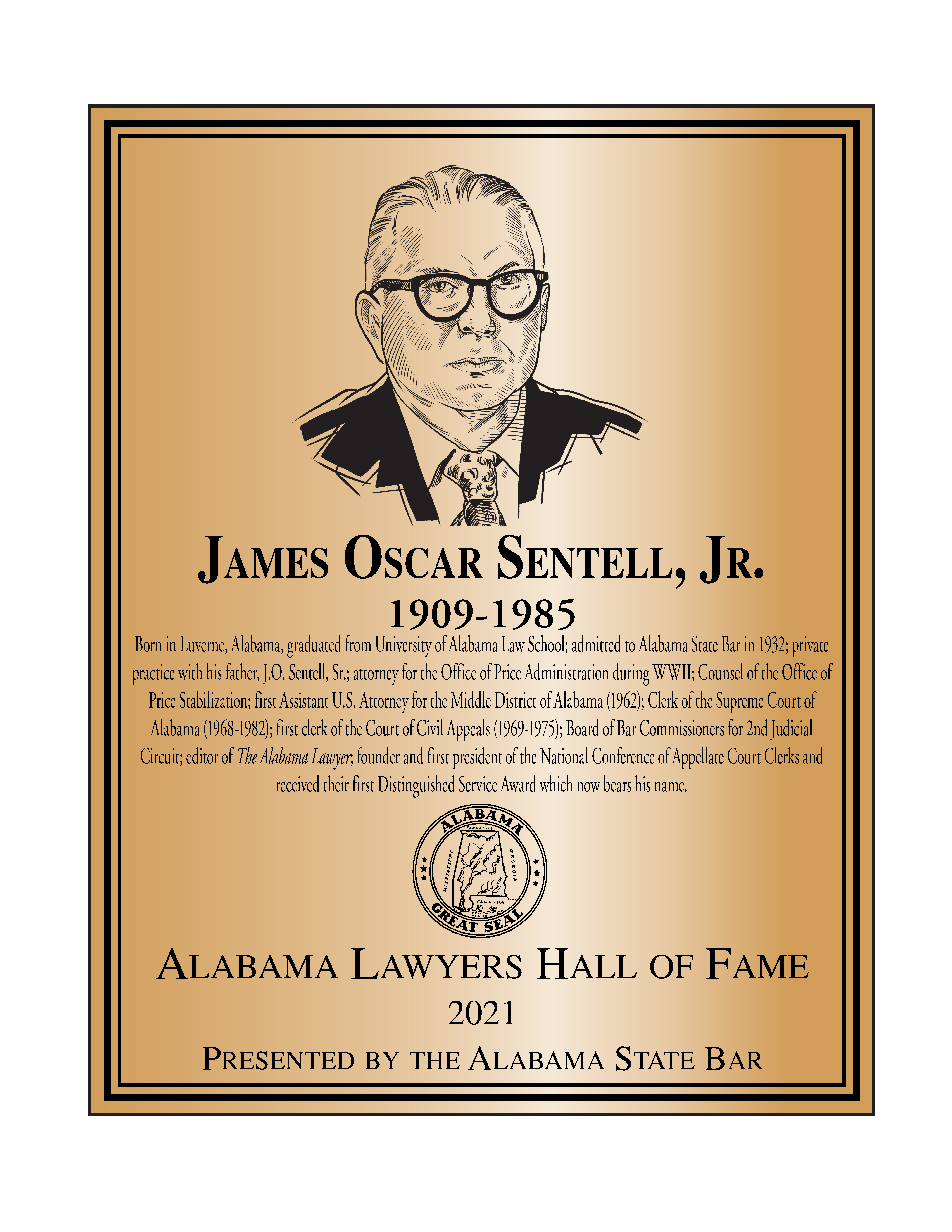 James Oscar Sentell, Jr. son of James Oscar Sentell and Ida Stakely Fonville, was born on July 3,1909 in Luverne, Alabama. Mr. Sentell earned his undergraduate degree from the University of Alabama in 1930 where he was a member of Omicron Delta Kappa leadership society. As a senior, Mr. Sentell won the Algernon Sydney Sullivan award in recognition of excellence of character and service to humanity. He earned his law degree from the University of Alabama Law School where he was a member of Phi Delta Phi society for ethics and professionalism. He was admitted to the Alabama State Bar in 1932, thus following in the footsteps his father, J.O. Sentell, Sr. who had been admitted to the Bar in 1892. From 1932 to 1937, Mr. Sentell practiced law in Luverne with his father and C.J. Kettler in the firm of Sentell, Kettler, and Sentell. When Kettler became Circuit Solicitor in 1938, the firm became Sentell and Sentell.
James Oscar Sentell, Jr. son of James Oscar Sentell and Ida Stakely Fonville, was born on July 3,1909 in Luverne, Alabama. Mr. Sentell earned his undergraduate degree from the University of Alabama in 1930 where he was a member of Omicron Delta Kappa leadership society. As a senior, Mr. Sentell won the Algernon Sydney Sullivan award in recognition of excellence of character and service to humanity. He earned his law degree from the University of Alabama Law School where he was a member of Phi Delta Phi society for ethics and professionalism. He was admitted to the Alabama State Bar in 1932, thus following in the footsteps his father, J.O. Sentell, Sr. who had been admitted to the Bar in 1892. From 1932 to 1937, Mr. Sentell practiced law in Luverne with his father and C.J. Kettler in the firm of Sentell, Kettler, and Sentell. When Kettler became Circuit Solicitor in 1938, the firm became Sentell and Sentell.During World War II, Mr. Sentell was the attorney for the Office of Price Administration (OPA) in Montgomery. The OPA was established by President Franklin Roosevelt to control money and rents after the outbreak of World War II. In 1946, Sentell returned to Luverne to practice with his father until 1951 when during the Korean War, he returned to Montgomery as Counsel of the Office of Price Stabilization (OPS), a post similar to the one he held during World War II. He served with the OPS from 1951 to 1953. Then Mr. Sentell practiced law in Montgomery from 1953 until 1962 when he was appointed as the first Assistant United States Attorney for the Middle District of Alabama where in participated in the prosecution of the Klansmen charged in the killing of civil rights activist Viola Liuzzo.
In July 1967, Mr. Sentell was appointed as Deputy Clerk of the Supreme Court of Alabama succeeding as Clerk of that Court in January of 1968. In 1969 the number of justices on the Supreme Court was increased from seven to nine, the Courts of Criminal and Civil Appeals were created, and the jurisdiction of the Supreme Court and the Court of Criminal Appeals changed. During his early years as clerk of the Supreme Court, he also served as the clerk of the newly created Court of Civil Appeals from 1969 until 1975 and was, by law, the secretary to the Court of the Judiciary from its inception until March of 1976. Numerous duties, including writing official opinions on the rules of judicial administration were also added to the office of clerk during Mr. Sentell’s tenure.
As if this tremendous amount of service was not enough, Mr. Sentell also served on the State Board of Bar Commissioners as the Commissioner for the 2nd Judicial Circuit from 1943 to 1946, was the editor of the Alabama Lawyer, the official publication of the Alabama State Bar Association from 1967 to 1982, and was one of the founders and first president of the National Conference of Appellate Court Clerks who honored Mr. Sentell as the first recipient of its Distinguished Service Award which now bears his name.
James Oscar Sentell Jr., served the bar of this state for more than 50 years as a private practitioner and in government service. He retired as Clerk of the Supreme Court in 1982 and passed away at his home in Montgomery on January 20, 1985. The Bench and Bar of the State of Alabama is proud to induct James Oscar Sentell, Jr. into the Alabama Lawyers Hall of Fame.
